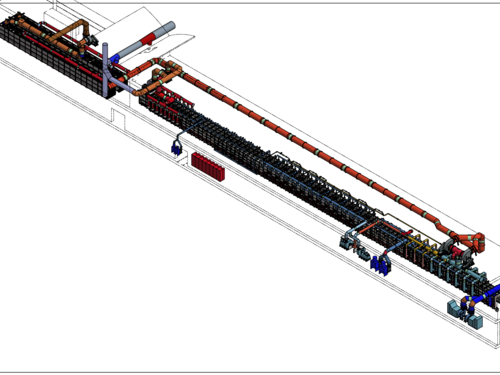An efficient, 80-meter-long high-temperature tunnel kiln is being built at the Höhr-Grenzhausen production site, which will operate at firing temperatures between 1,430 and 1,650°C. It will replace three discontinuously operating shuttle kilns, which are significantly less efficient in terms of energy consumption than a continuously operating tunnel kiln.
Particularly in the production of high-value products fired at temperatures up to 1,650°C, specific gas consumption per ton is significantly reduced. This investment is another energy efficiency measure that will make the production of refractory special bricks at Steuler sustainable in the long term. At the same time, Steuler is increasing its refractory production capacity with this investment. The increase in capacity became necessary because of growing orders from the steel industry, which is undergoing a green transformation and in which Steuler is considered a technology leader for the lining of direct reduction plants, among other things.
In order not to jeopardize ongoing production, the construction measures are taking place in various, closely coordinated, subsections:
In a first step, an old kiln plant was demolished in 2020. From May 2023, a foundation for the new high-temperature tunnel kiln, including kiln tracks, will be built above the working pit that was left in place and will continue to be used. In addition, the hall is currently undergoing extensive general refurbishment - some of the steel supports here are over 100 years old.
In parallel with the work on the infrastructure, kiln plant manufacturer Riedhammer (Nuremberg) has already started planning and manufacturing the new high-temperature kiln. It will be delivered from June 2023 in ready-built modules that will be assembled on site in Höhr-Grenzhausen.
Only once the new kiln has been installed and successfully commissioned (probably in November 2023) will one of the old shuttle kilns be shut down and dismantled. In its place will later be a continuous tunnel dryer, which will be operated with the waste heat from the new kiln and will pre-dry the products. The well thought-out positioning of the two units one behind the other will enable effective and efficient filling of the kiln in the future.
Completion of the entire project is scheduled for March 2024.


